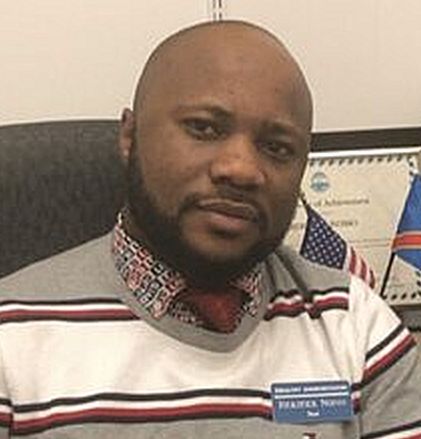Each week, new Mainers from African countries including Angola, Democratic Republic of the Congo and Republic of the Congo gather to play community soccer. Often we face opponents like the Somali team, Lewiston Star or the Bates Bobcats. But whomever we’re matched against, I want Manuel Vemba on my team. He’s a skilled midfielder who puts his whole heart into the game and inspires everyone to do the same.
As a community organizer, I know a lot of new Mainers. But I’m especially impressed by Manuel’s journey. Seven years ago, he lived in a poor, rural area of Angola, where there were few opportunities. But Manuel had dreams: he invested his life savings in a computer education and rental business. But not long after he’d purchased the necessary equipment, he was robbed and left with nothing.
One a whim, he applied for the Diversity Immigrant Visa Program. Known as the “diversity lottery,” the program gives green cards to immigrants, whose countries don’t typically send people to the United States. He never imagined he’d be selected; applicants have less than a 1% chance of winning. So when he got an email explaining he’d been selected, he thought it was a scam.
“I had no future in Angola. The country is so poor, and the government officials only care about themselves. Your dreams get stolen. So I was super happy when I heard I won the lottery. I knew it would change my life.” Manuel gathered the necessary documents and embarked on a two-year vetting process. He arrived here in 2016, at age 25. He was one of just two Angolans approved to immigrate through the program that year.
Manuel was still suffering from the robbery, but his family and neighbors held fundraisers to cover his ticket and support him financially through the transition. Winners of the diversity lottery receive no assistance from the American government and must prove that they will not be a financial burden on the country once they arrive. He purchased a one-way ticket and a few other essentials and flew to Portland. “I am here for the American dream,” he told the customs officers. They just laughed, but for Manuel his new life in America was no joke.
He already knew English, which gave him an advantage. A self-described “rule follower,” he spent his first few days learning the ropes. He figured out where the schools, Lewiston City Hall, police department and — crucially — the public soccer fields were located.
“Playing community soccer provides an avenue for new Mainers to come together with other people from similar backgrounds,” he pointed out. “We share the same languages, foods and love for this sport. It’s made Lewiston feel more like home.”
Within days of landing on American soil, Manuel went out and got the first of many jobs. He split his time between housekeeping shifts at a local resort and volunteering at Lewiston Adult Education, teaching computer literacy and technology. After a brief stint in Massachusetts playing for the Boston City Soccer Club, he returned to Lewiston and Manuel enrolled in business administration classes at Central Maine Community College. Today, he’s a housing educator at Lewiston’s Immigrant Resource Center. His job takes him out into the community where he educates new Mainers about rental assistance programs and personal finances to help families become and remain self-sufficient.
“We want to make sure immigrants are able to stay in their homes and don’t ruin their credit,” Manuel told me. “It gives them security, and that inspires them to reach for more because their basic need for shelter has been met.”
Manuel himself is proof that after some initial assistance, immigrants make tremendous strides. He now owns a home, making him one of more than 13,700 foreign-born homeowners in Maine. Collectively, this group adds $4.8 billion in housing wealth to the local economy, according to New American Economy.
At 30, he is married and raising a 7-month-old son. He regularly translates for Portuguese speakers at the public health coalition I work for, teaches Portuguese and basic computer skills at Lewiston Adult Education, referees soccer for middle and high schools and is the former vice president of the Angolan Association of Maine. “We want our American neighbors to see us as part of the community,” he said. “We have so much to share.”
Indeed. If you have even a passing interest in soccer, then check out a game (we usually play on weekends at different local fields). What you’ll find is more than community soccer. Our games are about finding community through soccer. And we’d love to share it with you.
Héritier Nosso is a health promotion coordinator and community organizer in Lewiston.
Send questions/comments to the editors.



Success. Please wait for the page to reload. If the page does not reload within 5 seconds, please refresh the page.
Enter your email and password to access comments.
Hi, to comment on stories you must . This profile is in addition to your subscription and website login.
Already have a commenting profile? .
Invalid username/password.
Please check your email to confirm and complete your registration.
Only subscribers are eligible to post comments. Please subscribe or login first for digital access. Here’s why.
Use the form below to reset your password. When you've submitted your account email, we will send an email with a reset code.